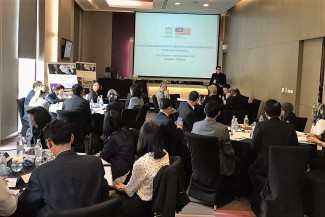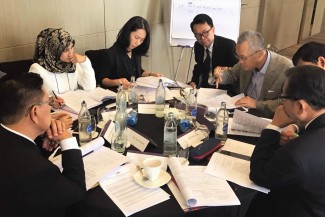Quality Assurance of TVET Qualifications - Third Expert Meeting, 31 Oct - 1 Nov 2016, Bangkok, Thailand
Quality assurance is fundamental to qualifications. Planned and systematic processes assuring the quality and consistency of the qualification process ensure that the qualifications or certificates issued have currency and are a valid and reliable testament to a learner’s knowledge, skills and wider competences. Strong quality assurance mechanisms that underpin the qualification process are particularly relevant in Asia-Pacific. With expanding socio-economic cooperation and integration within and between sub-regions, mechanisms for fair and transparent recognition of qualifications are needed to generate trust, facilitate workers’ and learners’ mobility and strengthen and promote lifelong learning.
Following the recommendation made at the 3rd International Congress on Technical and Vocational Education and Training held in Shanghai in 2012 to explore the possibility of developing quality assurance guidelines for the recognition of qualifications based on learning outcomes and to facilitate the international comparison and recognition of TVET qualifications, UNESCO Bangkok conducted a regional study to examine QA mechanisms supporting the qualification process in 12 countries in Asia-Pacific. The country studies contain up-to-date information on the nature and extent of TVET learning and evaluative description of the governance of quality assurance in TVET and assessment and validation processes underpinning the qualification processes, among others. The findings in the country studies have informed the formulation of regional Guidelines for designing effective and harmonized quality assurance of TVET qualifications.
In the framework of UNESCO’s regional study on QA of TVET qualifications and as a follow-up to the First and Second Expert Meetings held in October 2015 and July 2016 respectively, UNESCO Bangkok organized the Third Expert Meeting on Quality Assurance of TVET Qualifications on 31 October – 1 November 2016 in Bangkok, Thailand. The meeting brought together a range of international experts and national stakeholders from 10 countries throughout Asia-Pacific to discuss and review the main outputs of the project: the draft final report synthesizing the findings from the 12 country studies and the proposed regional Guidelines for effective quality assurance of qualifications systems.
During the meeting, researchers and practitioners in quality assurance of TVET as well as representatives of development agencies and employers’ organisations reflected on the key findings of the synthesis report and the proposed principles and indicators for the quality assurance of TVET qualifications in Asia-Pacific. Benchmarking exercises and focus group discussions during the sessions outlined the various stages of implementation and QA practices in countries and provided participants with peer-learning opportunities. The operationalisation, support and monitoring of the regional QA Guidelines were also discussed. In this regard, UNESCO has expressed its commitment to finalise both documents and further support the operationalisation of the Guidelines by engaging interested countries in peer-learning activities and providing technical assistance based on formal requests. To ensure that the Guidelines remain current and reflect the needs of the Asia-Pacific community, it is anticipated that an evaluative survey will be conducted in 2018 to measure countries’ progress and identify areas for improvement.
UNESCO Bangkok looks forward to continued developments and to strengthening ties in this area. For more information, please contact TVET and Skills Development Team [ap.tvet(at)unesco.org], Section for Educational Innovation and Skills Development, UNESCO Bangkok.










